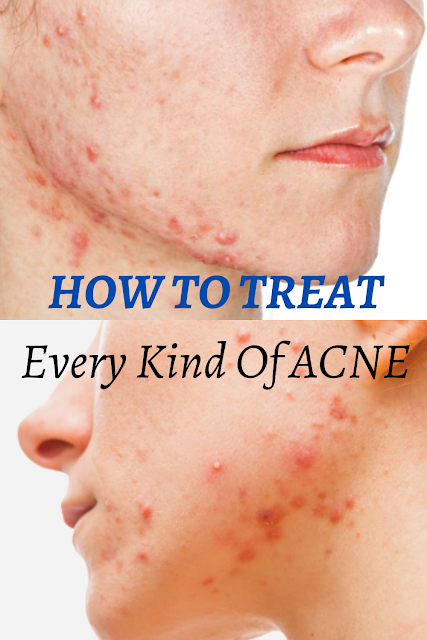Acne is the most common skin problem in the United States, with about 40 to 50 million sufferers. Here are the treatments dermatologists recommend for every type of acne.
Acne might be the great equalizer, plaguing all of us alike. But, not all acne is made equal. Various factors — like your diet, stress levels, and hormones — can lead to different types of breakouts. The good news: Some kinds are easier to treat than others. The bad news: Each type of pimple requires its own plan of attack. Once you figure out why you’re breaking out, though, it gets easier and easier for you to prevent acne altogether. Here, a breakdown of what might be behind that breakout — and what you can do about it.
1. Your problem: Nodules and Cysts
Nodules and cysts are large bumps that are rather painful to touch. You might be tempted to pop this pimple because of how big it is but make sure you don’t do that because that would leave a bad scar behind. This is when you need to consult a dermatologist along with adopting a skin care routine targeted towards acne prone skin. We suggest using the Pond’s Pimple Clear Face Wash twice daily as its Active Thymo-T essence works towards controlling excess sebum production and hence, reducing pimples. To reduce the scars on your acne prone skin, we think going with the Fair & Lovely Anti-Marks Treatment might be a wise move. It penetrates 3 layers deep into your skin and works right from the roots to reduce the scars caused by pimple popping.
2. Your Problem: Whiteheads
Whiteheads are tiny blemishes aka closed comedones that have oil and dead skin enclosed inside. They are caused by excess oil production that settles into pores. To get rid of acne like whiteheads, you must rely on oatmeal since its abrasive quality will slowly and surely help your skin get better with time. Just take 1/3 cup of oatmeal, ¼ cup brown sugar and ¼ cup honey. Mix it up and apply this to your face while leaving it for 3 minutes before washing off.
3. Your Problem: Blackheads
These are open comedones that have turned black due to exposure to air. What causes blackheads? They’re primarily a result of bad skin care hygiene and excessive dead skin buildup. What your skin is in dire need of is a scrub that will not only control oil but also get rid of the blackheads. You can rely on the St.Ives Fresh Face Apricot Scrub because this helps in buffing away dead skin. It contains apricot that soothes your skin. That’s not all, it also contains Vitamin A, Vitamin B and Vitamin E, all of which deeply hydrate your skin.
4. Your Problem: Redness and Inflammatory Acne
This is when your skin is inflamed and there are reddish pimples—a result of extremely sensitive skin. These kinds of acne are filled with bacteria and need something anti bacterial to soothe. We suggest going with a cleanser that’s infused with green tea that contains Catechins, which are antibacterial properties—agents that aid in killing acne causing bacteria. We suggest using the Citra’s Pimple-Clear Face Wash, which is infused with Japanese green tea that reduces pimples and oiliness from the skin.
5. T-zone Acne
Acne that shows up across the forehead, nose, chin in a T-shape formation, is very common. It's often caused by pollution and most often produces red zits and whiteheads. "Whiteheads are typically what is found on the T-zone area, so over-the-counter products that contain salicylic acid or benzoyl peroxide, such as ProactivMD Deep Cleansing Wash, and retinoids should clear this type of acne," says Dendy Engelman, MD, a dermatologist at Manhattan Dermatology and Cosmetic Surgery, New York City.
6. Cystic Acne
This is one of the types of acne that typically occurs deep beneath the skin's surface and is incredibly painful. "Like most blemishes, this type of acne results when pores become clogged with oil and dead skin cells, but the infection dives deeper into the skin, resulting in larger red bumps that fill with fluid," says Dr. Schlessinger. "Cystic acne typically results from hormone changes, which is why it's most common in teenagers, though it may affect people of all ages." Unlike whiteheads and milder blemishes, cystic acne isn't a waiting game, so a dermatologist should be consulted to come up with a regimen that best suits your individual needs. "Typically a combination of antibiotics and prescription-strength topical treatments works the best," he says. "If this isn't doing the trick, isotretinoin may be used for more stubborn cystic acne." Here are more tips on how to get rid of cystic acne.
